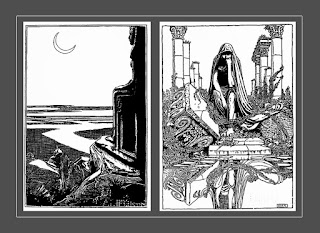Three times Edgar Allan Poe dissed the Moon
 |
| Georges Méliès, A Trip to the Moon, 1902 |
Pagans, poets, and prognosticators have all marveled at the
captivating allure and beauty of the full moon in the sky, but don’t count
Edgar Allan Poe among the moon-worshipers.
While others rave about the great moon this Tuesday (called
both a “super moon” because it will be full at its closest point to Earth
along its slightly elliptical orbit, and a “snow” moon because Native Americans
and Europeans associated the February moon with wintry weather), Poe might
grouse under his breath as he did in his poem “Evening Star”
(1827),
Too cold — too cold for me
Even though it is a cliché for Gothic horror classics to
have the full moon set the stage for vampires and werewolves to activate, Poe never
contracted their full moon fever. In
fact, rather than triggering magic and supernatural activity, Poe found the earth’s
natural satellite to be a big yawn.
Literally.
In “The Sleeper”
(1831),
An opiate vapor,
dewy, dim,
Exhales from out her
golden rim,
And, softly
dripping, drop by drop,
Upon the quiet
mountain top,
Steals drowsily and
musically
Into the
universal valley
—and lures the entire natural world beneath it into a deep slumber. Opiates dripping from the moon cause the “universal valley” to fall into a
drug-induced daze, until “All Beauty
sleeps” and the elements fallen under this spell “would not, for the world, awake.”
In “Tamerlane”
(1827), Poe goes a step further in belittling the somnolence he associates with
the moon:
What tho’ the moon —
the white moon
Shed all the
splendor of her noon,
Her smile is chilly — and her
beam,
In that time of
dreariness, will seem
(So like you gather
in your breath)
A portrait taken
after death.
In the lines preceding, Poe has set up this discussion as
the outlook of one who has lost hope, which takes some of the bite away from
what follows but, still, the slight
is startling in its bluntness. He pretty
much is saying that the iciness of the moon’s glow is reminiscent of Death.
In “Evening Star,” Poe makes a more sparing put-down, and
one which more fully lays out the full reason Poe is not bowled over. Poe notes how the moon, despite emitting a “cold” light (an oft-repeated criticism),
still outshines the other stars, making the “planets her slaves” by overpowering them with its brightness, and
commanding the tides: “Herself in the
Heavens, / Her beam on the waves.”
He acknowledges that the moon presents a plausible, albeit “cold smile,” which he waves off as noted
above (“Too cold — too cold for me”). Then Poe turns to the “Evening Star” (i.e.,
Venus), and states that he admires its “glory
afar,” finding it preferable and a source of pride:
And more I admire
Thy distant fire,
Than that
colder, lowly light.
Poe seems to understand that the stars, the true stars,
which constitute the majority of the points of light in the heavens—including the
faintest of them—are made of “fire,”
as opposed to the moon, which, for all its luminosity, is merely “light”—and, reflected light, at that!
At a deeper level, Poe is asserting his preference for the underdog:
the “enslaved” stars are more noble than their celestial bully. A still more poetic reading may reveal a
message that Poe prefers the possibility, however remote, of an improbable and
unreachable passion (“distant fire”), to the
nearness and attainability of a more rational
prospect (“colder, lowly light”).
The stars are harder to fathom, more challenging to wrap our
heads around, than the big glaring moon—and that
is precisely why, to someone like
Poe, they are also infinitely more interesting and more attractive.




Comments
Post a Comment